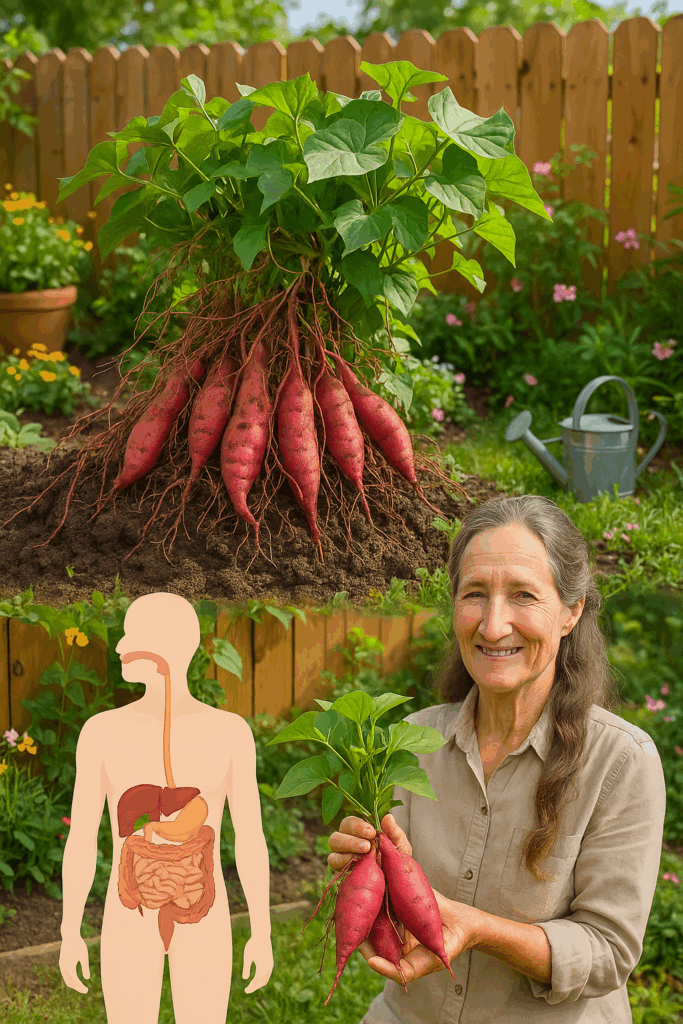🌞 Imagine harvesting baskets of golden sweet potatoes without needing a sprawling backyard or perfect soil. Whether you live in an apartment or have rocky ground, growing sweet potatoes in soil bags is a brilliant solution that delivers stunning results. Easy to set up and even easier to maintain, this method unlocks sweet potato success for gardeners of all experience levels. Let’s explore how to do it right for a bumper crop you can proudly call your own.

🍀 Why Choose Soil Bags for Sweet Potatoes?
Soil bags offer a flexible, compact environment where sweet potatoes can thrive. They ensure proper drainage, aeration, and soil control, dramatically improving your chances of success compared to planting directly into unpredictable garden soil. Plus, soil bags make harvesting cleaner, simpler, and more satisfying.
🛠️ Essential Supplies to Start
Before you begin, gather these key materials:
🌱 Sweet potato slips (young, rooted plants)
👜 Soil bags or large grow bags
🌿 High-quality potting soil or a homemade blend of compost and garden soil
🚿 Watering can or gentle garden hose
🌾 Fertilizer suitable for root crops
🛠️ Garden trowel or small shovel
🪴 Mulch materials like straw or dried leaves
🧵 Optional stakes or trellises for vine support
✨ Preparation is everything—having the right setup makes the entire growing process smoother.
🌞 Choosing the Perfect Sunny Spot
Peppers may love sun, but sweet potatoes are just as demanding. Find a spot where your soil bags will get at least 6–8 hours of full sun each day. The more sunlight they soak up, the bigger and sweeter your tubers will grow. Avoid shady areas at all costs, as weak sunlight leads to weak plants.
🪴 Preparing Your Soil Bags
Whether you buy commercial soil bags or use sturdy grow bags, filling them properly is crucial:
🌿 Use a loose, well-draining potting mix that encourages strong root development.
🌿 If mixing your own, blend equal parts compost and garden soil for a rich, fertile medium.
🌿 Leave about 2–3 inches of space at the top of each bag to allow for watering without overflow.
✨ Healthy roots mean healthy harvests—never skimp on soil quality.
🌱 Planting Sweet Potato Slips the Right Way
Slips are the secret to growing sweet potatoes successfully:
🌿 Dig small holes about 4–6 inches deep in your soil bags.
🌿 Space slips about 12–18 inches apart to give them room to expand.
🌿 Plant slips upright with the roots down and the leafy stems above the surface.
🌿 Gently press the soil around each slip to secure it in place.
🌟 The way you start them sets the tone for the entire season—plant with care.
💧 Watering: Consistency Is Key
Sweet potatoes love moisture but despise soggy conditions:
🚿 Water thoroughly after planting to settle the soil.
🚿 Keep the soil evenly moist throughout the growing season, checking daily in hot weather.
🚿 Water in the morning so the leaves can dry by evening, reducing disease risk.
✨ A simple routine of deep, consistent watering makes all the difference.
🌿 Feeding Your Sweet Potato Plants
Nourishing your plants properly ensures a rich harvest:
🌾 Apply a balanced, slow-release fertilizer a few weeks after planting.
🌾 Repeat fertilization every 4–6 weeks during the growing season.
🌾 Avoid fertilizers high in nitrogen—these will create lush vines but few tubers.
🌟 Focus your feeding on the roots, not the leaves, to encourage tuber growth.
🧵 Supporting Your Vines (Optional)
Sweet potato vines are natural sprawlers but can be managed for better results:
🪴 Install stakes, cages, or simple trellises to guide upward growth.
🪴 Gently tie vines to supports as they grow.
🪴 Controlled vines mean easier watering, mulching, and harvesting later on.
🌿 Organized plants are healthier plants, leading to bigger harvests.
🍂 Mulching: The Protective Blanket
Adding mulch is like giving your sweet potatoes a cozy shield:
🌾 Lay down straw, shredded leaves, or even black landscape fabric around the plants.
🌾 Mulch locks in moisture, suppresses weeds, and keeps soil temperatures stable.
🌾 Keep mulch a few inches away from stems to prevent rot.
✨ Smart mulching saves you time and boosts your yields effortlessly.
⏳ Knowing When to Harvest
Patience pays off with sweet potatoes. Here’s what to look for:
🍠 Expect to harvest about 100–120 days after planting.
🍠 Yellowing leaves are a natural sign that harvest time is near.
🍠 Use your hands or a small shovel to gently dig around the base and lift tubers carefully.
🌟 Harvest gently—bruised or cut sweet potatoes spoil faster.
🔥 Curing for Maximum Flavor and Shelf Life
Curing sweet potatoes transforms them from ordinary to extraordinary:
🌡️ Place harvested tubers in a warm, humid space (80–90°F with 85–90% humidity) for 10–14 days.
🌫️ This step heals minor cuts, boosts sweetness, and extends storage life dramatically.
❄️ After curing, move your sweet potatoes to a cool, dry, dark place for long-term storage.
✨ Proper curing is the hidden magic that turns your homegrown sweet potatoes into gourmet treasures.
🥇 Sweet Success in Soil Bags
Growing sweet potatoes in soil bags is a game-changing technique that makes it possible for anyone to enjoy this nutrient-rich crop, even with minimal space. With the right sunlight, soil, watering, and attention to detail, you’ll be amazed at how easy it is to produce generous harvests.
🌱 Whether you dream of whipping up sweet potato pies, roasting golden wedges, or enjoying fresh garden-to-table meals, starting your own sweet potato bag garden could be your most rewarding gardening decision yet.
Ready to dig in? 🍠 Get your soil bags ready, plant those slips, and unlock the delicious world of homegrown sweet potatoes today!





